All images courtesy of Steve Williams/Budgie

For diehard fans of early hard rock, and heavy metal, bands such as Black Sabbath, Deep Purple, and Blue Cheer are often referenced as the proverbial forefathers of the genre, but there is another immensely important band who critically important to its development.
That band is proto-metal masters, Budgie.
Hailing from Cardiff, Wales, the original trio of Burke Shelley (bass and vocals), Tony Bourge (guitar), and Ray Phillips (drums), for Budgie with an eye on taking the hard rock scene by storm, aiming to create music in a manner which hadn’t been done before.
The first three Budgie albums, Budgie, Squawk, and Never Turn Your Back on a Friend are seminal, genre-defining classics, but it wasn’t until the entry of Steve Williams on drums, and the subsequent recording of Budgie’s 1975 classic, Bandolier, that things took off for the band.
In Williams, Budgie found a more versatile drummer, more adept at varying styles, and time signatures, and one more apt to musically experiment, which suited the multi-layered musings of Budgie’s leader, Burke Shelley.
While Budgie never garnered much commercial success, the band were critical darlings, and their ravenous, cult fanbase, kept live shows and tours at peak levels.
As the early 80s dawned, Budgie began to get its due, headlining festivals, and touring with the likes of Ozzy Osbourne, but continued, and perhaps ill-timed experimentation, and a shifting scene soon led to the end of Budgie’s first chapter. To Steve Williams’s credit, his thunderous, metronomic, yet inspired playing was the engine that drove the band and served as a steadying force during some perhaps tumultuous times.
Budgie’s final lap, which began once more in 1999, ended in 2010 when Burke Shelley became sadly ill, eventually leading to his passing in January of 2022, officially putting any hopes of a reunion to an end. Still, long after Burke Shelley’s passing, Budgie’s legend and influence will only continue to grow and inspire those who take the time to listen.
I recently dug in with Budgie’s longtime sticksman, Steve Williams, for a rare, and career-spanning interview.
Andrew:
Steve, thank you for taking the time. How have you been holding up?
Steve:
I’m doing okay, thanks. Needless to say, this is a very sad time with the loss of Burke Shelley, my friend, and fellow bandmate for over forty years.
Andrew:
Before we dive into your professional career, let’s go back. What got you hooked on music?
Steve:
I saw a Christian band at my local Pentecostal chapel aged around twelve, and even though the music itself didn’t inspire me, the idea of being in a band did, and I more or less decided that very evening I wanted to be a musician.
Andrew:
As a young musician, what gravitated you toward the drums? Who were some of your early influences?
Steve:
I actually started out as a bass player. I was about fourteen, and eager to get into a band so, as the guitarist of a local group who was just getting together and also had a bass guitar, when asked to join I jumped at the chance. A couple of weeks later, the drummer left, a bass player much more advanced than me came in, and I took the seat behind the kit, which also belonged to the guitarist. I fell in love with drumming and the rest, as they say, is history.


Andrew:
You joined Budgie in 1974. Prior to that, if you can, paint a picture of some of your early gigs where you cut your teeth, so to speak.
As I said, I started out playing in a local band with a bunch of school friends but from the outset, I had the ambition, and the desire to make a career for myself in music. There were a lot of young local bands about in the late 60s, and I auditioned and got jobs with quite a few of them, but local wasn’t for me, and I realized if I was to make a living with my craft, I’d have to move to the city. I ended up in Cardiff and finally started making enough to call myself a “pro.” I did a two-month stint in Germany with a band called “Iona,” who would later become Lone Star, and prior to Budgie, I toured the UK and Europe with the original outfit, Quest.
Andrew:
Take me through your induction into the Budgie fold as the short-lived, Ray Boot’s, replacement. How did you first meet Burke Shelley and Tony Bourge?
Steve;
I actually met Burke and Tony sometime before joining the band after a gig I’d attended at a club near where I lived. I was blown away by how professional they were, and how huge their sound was for a three-piece. They signed a photo for me, which I still have, and laughed when I told them how they looked much taller on stage. That was around 1970, and little did I know that four short years later, I’d be on those stages with them. I was offered an audition when Ray [Phillips] left the band, but things didn’t work out, and I left Cardiff for a while. When I returned, Pete Boot was on his way out, and the chance of a second crack at it came up. Thankfully, I made it to that audition. [Laughs].
Andrew:
Your first record with Budgie is probably one of the band’s best in Bandolier. What do you recall about your first experience in the studio with Budgie?
Steve:
It was a dream come true. We had plenty of gigs under our belt by the time we went into the studio, so we were pretty tight, but the whole recording thing was new to me, and I was grateful for the advice, and support that came so easily from Burke and Tony, who were old hands at the game by then. I enjoyed every minute, and the memories of the whole experience remain as vivid today as they were forty-odd years ago.

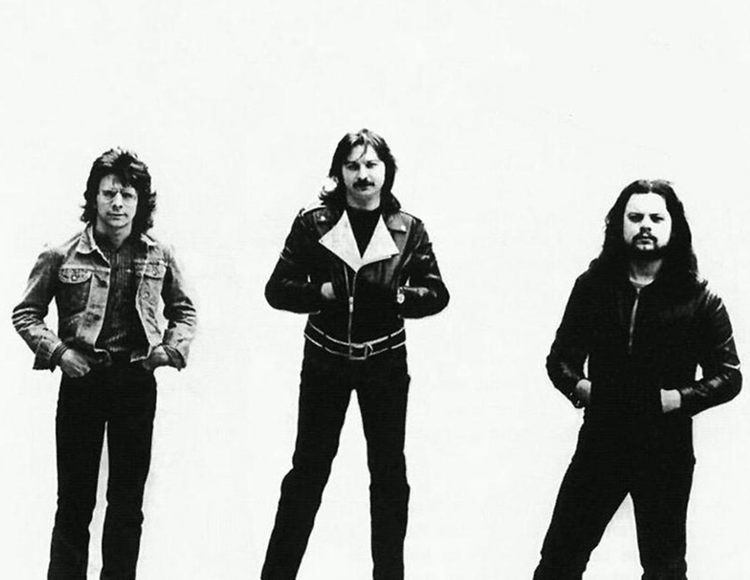
Andrew:
As you alluded to, Ray Phillips was Budgie’s original drummer, and his replacement Pete Boot didn’t seem to capture the vibe of those early records. This said, what did you bring to the table at the time to capture the band’s legacy, while also moving it forward?
Steve:
Having been in cover bands before Budgie, I was experienced in copying other drummer’s work, but from the get-go, Burke would ask me to put my own stamp on the tracks we included from the first four albums in the live show. I think it worked, and it seemed to help breathe new life into songs Burke, and Tony had played hundreds of times and, at least for the band, had started feeling a little stale. The new material being written became a lot more fluid and, for want of a better word, experimental. Ray and Pete had both been out and out rock drummers, whilst I had a more “colorful” musical background, which included funk, and even Latin American. I believe this gave the boys room to expand their writing to reflect more of their own eclectic musical tastes. I would say though that, in hindsight, this freedom may have contributed to some of the later albums not being so widely accepted by many of Budgie’s heavy rock fans, meaning my influence on the band’s musical direction may not have always been positive.
Andrew:
What do you recall about your first tour with Budgie? Walk me through your early days on the road with the band.
Steve:
Exciting, educational, and extremely hard work. Much harder than I’d dreamed of as an aspiring young muso, but just as fulfilling and rewarding as I’d hoped. It felt so good to finally be part of a recording and touring band, playing to ever-increasing crowds of fans, who bought the albums and queued in all kinds of weather to hear the band play live. The sex, drugs, and rock ‘n’ roll lifestyle was also there, though not for Tony and Burke, who were both married with young families, but, as cliched as it sounds, the music always came first with Budgie, and an enormous amount of work went into recording records and putting on live shows.
Andrew:
As the 70s drew to a close, Budgie experienced several lineup shifts, which included the loss of founding member Tony Bourge. How did Tony’s departure affect the interpersonal, and sonic dynamics within Budgie at that time?
Steve:
Tony’s departure had a massive effect on all aspects of the band and almost caused its demise. He had been such a musical force within the band, and a perfect writing partner for Burke. He was also the nicest guy and a real gentleman. The year following his leaving was one of the most difficult in the band’s long history. We teamed up with guitarist, Rob Kendrick, who as good a musician as he was, simply wasn’t the man for the job. Luckily, toward the end of 1979, John Thomas came along and saved the day. He was a force to be reckoned with, and a very talented guitarist. Burke and I often wished we’d met him a year earlier.


Andrew:
While Budgie was, and is, vastly underrated, by the end of the 70s, and the dawn of the 80s, as a proto-metal band, Budgie was garnering some recognition amongst the New Wave of British Heavy Metal. If you can, take me through that period, and give us some insights into Budgie’s influence over the genre of heavy metal.
Steve:
Having spent much of the late 70s in the US, we luckily missed much of the UK punk era, and by the time John Thomas joined the band, the so-called NWOBHM was underway, and with Johns’s input, we were lucky enough to get a foot on that ladder. Support tours with Ian Gillan, and Ozzy Osbourne gave us the exposure needed to get the band’s name back out there, and our pedigree earned us respect from both the fans and other bands, many of whom recorded the now well-recognized Budgie covers.
Understandably, I suppose, it was the older, more grungy, songs from the first three albums that seemed to influence the up-and-coming metal bands, and I lost count of the young musicians who made their way to our dressing rooms to meet and pay homage to Burke, and his music.
Andrew:
As I mentioned, Budgie began to experience success in the wake of the wave of heavy metal in the late 70s, and early 80s, and in 1980, the band played Reading Festival, and in 1982, Budgie headlined Reading Festival. After so many years in the shadows, why do you feel Budgie finally began to catch on around this time?
Steve:
I don’t, actually. If being in the shadows means being a cult band, I’d have to agree, but the name Budgie was well known and growing throughout the 70s. We never had problems selling tickets for our live shows, though commercial success always seemed just out of our grasp.
Andrew:
Also of note, in the early 80s, Budgie gained a significant following in Europe and was the first heavy metal band to play behind the Iron Curtain in 1982. What was that experience like, and why do you feel Budgie was so popular in the European market?
Steve:
The popularity Budgie enjoyed in Poland took us all by surprise, and the reception we received on the ’82 tour, which took place while the country was under martial law, was overwhelming. The whole tour sold out, and it was quite an emotional experience to play to huge crowds knowing that the two hours, or so each concert lasted, was briefly taking people away from the harsh reality they faced daily, living in a country still in the grip of the, then, Russian empire. We all agreed that the tour was the most memorable we had ever done.


Andrew:
Budgie was the supporting act for Ozzy Osbourne on his Blizzard of Oz Tour, in 1982, which was a particularly wild time in Ozzy’s trajectory. Take me through how Budgie got the gig, and your time on the road with Ozzy and his band which included Randy Rhodes, Lee Kerslake, and Bob Daisley.
Steve:
Our manager at the time, Adrian Hopkins, promoted the tour, so our support slot for Ozzy was entirely down to him and turned out to be one hell of a ride. Ozzy was great, and his crew looked after us very well. We were treated with respect, and the fact that we could really warm every crowd up ready for his performance was appreciated. The two musicians you mentioned were aloof and kept their distance, but Ozzy was approachable, and great fun to be around. Randy Rhodes was also a very nice guy, and he and John Thomas became good friends during the tour. One of the many funny stories I often recall is of the night Burke and I were settling into our shared hotel room, after a gig, when there was a knock on the door. I opened it to find Ozzy standing there with a bottle of brandy in his hand. He asked if he could hide in our room as Sharon was on the warpath, and looking for him. Apparently, he’d promised not to drink on a gig night. We let him in, and within five minutes, Sharon was also banging on our door. Ozzy hid in the wardrobe, while I lied to Sharon, and told her we hadn’t seen him. For the next couple of hours, we helped him empty the bottle of brandy and listened to the most hilarious life story ever told. As I said, this was a fun, unforgettable tour.
Andrew:
With Budgie seemingly peaking amongst a burgeoning heavy metal scene, what led to the band’s decision to begin experimenting with synths and funk elements on its later albums?
Steve:
Again, Burke’s eclectic musical tastes came to the forefront during songwriting, especially on Deliver Us From Evil. I guess we were all open to something new having played together for so long, and it was only with hindsight that I personally regretted incorporating so many keyboard parts into the recording. I’m extremely proud of that particular album, and thoroughly enjoyed recording it, but I completely understand the mixed reaction it received being so far removed from the accepted Budgie sound.
Andrew:
What led to Budgie’s freeze on recording after 1982’s Deliver Us From Evil leading up to the band’s break up in 1987? Why did the band choose to fold in the late 80s?
Steve:
Losing our record deal and not finding another. Simple as that. I guess the band had run its course, and it was time for us all to move on. I was the first to leave to be replaced for a short while by UFO’s Jim Simpson, but eventually, it became obvious that without management, and a record deal, the band struggled to stay afloat, and Burke finally wrapped it up around 1987.
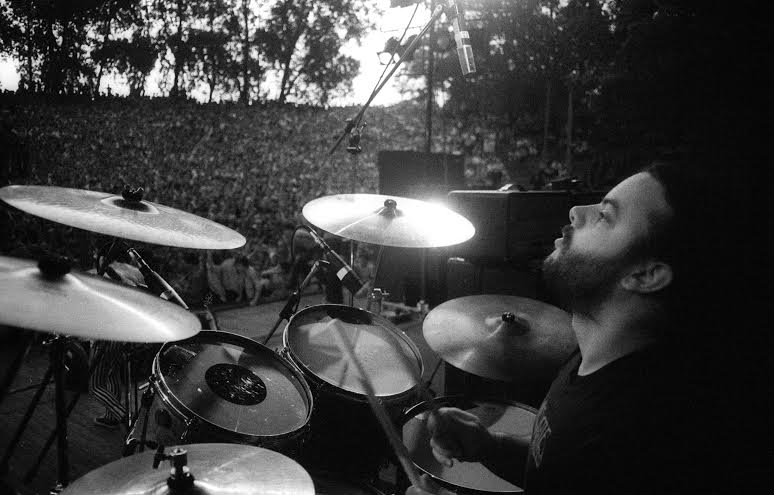

Andrew:
Take me through Budgie’s brief reunion in 1995/1996, and then again in 1999-2010. Why didn’t the mid-90s attempt stick, and what led to the second try being so successful?
Steve:
Well, I wasn’t involved in the ’95/’96 trips to Texas. Ex Love Sculpture drummer, Rob “Congo” Jones, sat in my old seat, and the band was responding to lucrative offers to play at large festivals in San Antonio. An American town with a particularly strong, hardcore, Budgie following. Both trips were successful, and the band was asked to return in 1999. This time, out of the blue, I was asked along, and during rehearsals, it was obvious everyone felt so comfortable being together again after thirteen years it would be a good idea to play more gigs. Unfortunately, a few years later, after another trip to Texas, JT became seriously ill and had to leave. Andy Hart replaced him, and the band carried on. Another change of guitarist put us together with Simon Lees, and the band went from strength to strength touring, recording again, and playing large festivals across Europe and Scandinavia. For me, Simon took us to another level, and the band started cooking again, but it wasn’t to last sadly, and Simon bowed out just before our first ever Australian tour in 2008. Craig Goldy stepped into the breach, and once again, we were rock ‘n’ rollin’.
Andrew:
Budgie recorded one final album in 2006 called You’re All Living In Cuckooland. What do you remember regarding the sessions and the album’s reception? How do you feel it holds up against the band’s classic records?
Steve:
All I’d say about Cuckooland is, with the greatest respect to his memory, this was a Burke Shelley album. Simon and I played on it but, even though Simon did contribute to the writing, it was never a true collaboration, which is always what made previous Budgie albums…Budgie albums. I like some of the tracks, but I understand completely why it wasn’t received well by true Budgie fans who, I believe, were expecting a return to the heavy, riff-laden sound of earlier albums, especially after such a long wait.
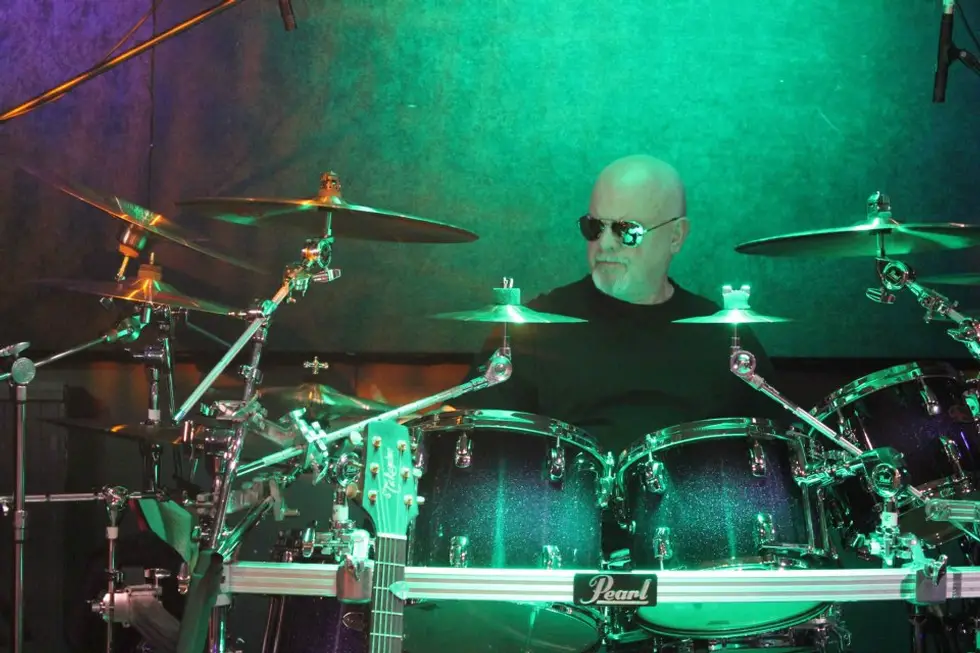
Andrew:
As I mentioned before, the band was together again from 1999 to 2010. Why didn’t see more new music released during that time? We know it’s hard for “legacy acts” to garner attention when it comes to their new music, was that part of the reason?
Steve:
I honestly believe Burke was weary of the burden of producing new material, and as he was the driving force behind the band, it was impossible to record what wasn’t there. There are several recordings of new songs recorded with Craig Goldy that may one day see the light of day, and a live album, again with Craig on guitar, recorded during a tour of Poland in 2009 that’s being mixed at the moment.
Andrew:
Since the end of Budgie, you’ve been drumming in Welsh band, Mr. Hate. Take me through you joining the band, and what’s next. What’s next on your docket beyond that for 2022?
Steve:
Mr. Hate is a local covers band. Nothing serious. Just a bunch of mates too old to tour, and too young not to keep getting up on stages. Great musicians and dear friends. I’ve just left the band, and wish them all the best for the future. As for what’s next for me — REST! For now. [Laughs].
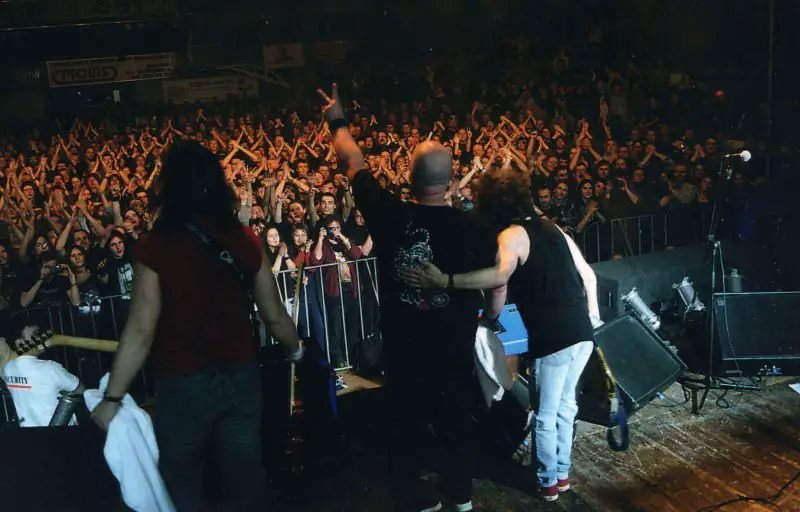
Interested in learning more about Budgie? Hit the link below:
Be sure to check out the full catalog of VWMusic Interviews, by Andrew Daly, here: www.vinylwritermusic.com/interviews
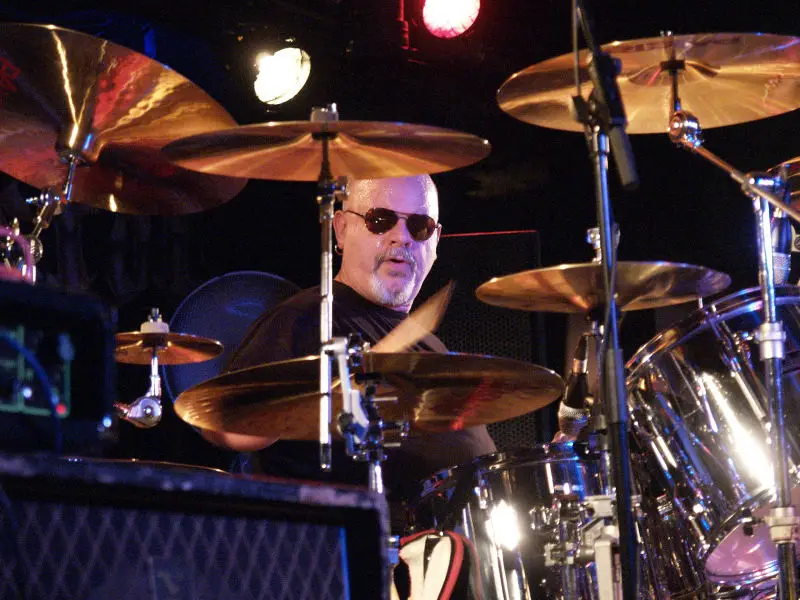




Leave a Reply